Treesong's Blog: Treesong on Goodreads - Posts Tagged "global-warming"
Goodbye Miami
The year is 2030. A Category 5 hurricane makes landfall in southern Florida. After decades of rising sea levels, the incredible storm surge caused by Hurricane Florence is enough to leave the city of Miami underwater. As the storm clears, it becomes painfully obvious that the waters won't recede anytime soon. Many of the city's inhabitants become refugees, and the few that remain will have to struggle to make their city livable again.
This is the premise of Goodbye Miami.
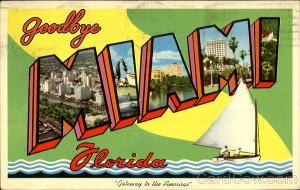 Goodbye Miami is a climate fiction blog that tells the tale of Kass, an American climate refugee who flees Miami in the wake of Hurricane Florence. Since it's the tale of a refugee, much of the story takes place outside of Miami. Wherever the main character travels, though, the story is always an exploration of the causes and consequences of climate change.
Goodbye Miami is a climate fiction blog that tells the tale of Kass, an American climate refugee who flees Miami in the wake of Hurricane Florence. Since it's the tale of a refugee, much of the story takes place outside of Miami. Wherever the main character travels, though, the story is always an exploration of the causes and consequences of climate change.
I invite and encourage you to check out Goodbye Miami. For the full effect, start from the beginning and work your way forward to the "present" (today's date in 2030). If you like what you see, please share it with your friends. You can even become a supporting character in the story by posting a comment from the perspective of someone who lives in 2030. The comments are moderated, so if I like your comment, I will approve it. I can also change your username to whatever character name you like.
Thanks for your interest and support! I look forward to hearing your feedback about Goodbye Miami. In the meantime, if you enjoyed Change, have no fear. I'm still working on Order, the next book in that series. I find it very helpful to work on at least two projects at once. That way, at any given moment, I'm bound to feel motivated and inspired to write at least one of them!
This is the premise of Goodbye Miami.
 Goodbye Miami is a climate fiction blog that tells the tale of Kass, an American climate refugee who flees Miami in the wake of Hurricane Florence. Since it's the tale of a refugee, much of the story takes place outside of Miami. Wherever the main character travels, though, the story is always an exploration of the causes and consequences of climate change.
Goodbye Miami is a climate fiction blog that tells the tale of Kass, an American climate refugee who flees Miami in the wake of Hurricane Florence. Since it's the tale of a refugee, much of the story takes place outside of Miami. Wherever the main character travels, though, the story is always an exploration of the causes and consequences of climate change.I invite and encourage you to check out Goodbye Miami. For the full effect, start from the beginning and work your way forward to the "present" (today's date in 2030). If you like what you see, please share it with your friends. You can even become a supporting character in the story by posting a comment from the perspective of someone who lives in 2030. The comments are moderated, so if I like your comment, I will approve it. I can also change your username to whatever character name you like.
Thanks for your interest and support! I look forward to hearing your feedback about Goodbye Miami. In the meantime, if you enjoyed Change, have no fear. I'm still working on Order, the next book in that series. I find it very helpful to work on at least two projects at once. That way, at any given moment, I'm bound to feel motivated and inspired to write at least one of them!
Published on July 28, 2014 23:10
•
Tags:
climate-change, environment, global-warming, green
Fall Harvest Sale
In honor of Autumn Equinox, the harvest festival of Mabon, and the People's Climate March, I'm having a Fall Harvest Sale! For the next few hours, you can get the Kindle edition of my novel, Change, for just 99 cents. That's a 75% discount! This is a Kindle Countdown Sale, so the sooner you order, the better your bargain will be. The price will go up a dollar every couple of days until it returns to normal price. Buy your copy now and invite your friends to do the same!
In other news, have you checked out my climate fiction blog? Goodbye Miami is the tale of an American climate refugee who is displaced by Hurricane Florence in the year 2030. Follow Kass's adventures by visiting the Goodbye Miami blog and liking Goodbye Miami on Facebook. Life has been quite busy lately. I have plenty of other news and thoughts to share, but I'll save that for another entry after the sale. In the meantime, I hope you enjoy Change and Goodbye Miami!
In other news, have you checked out my climate fiction blog? Goodbye Miami is the tale of an American climate refugee who is displaced by Hurricane Florence in the year 2030. Follow Kass's adventures by visiting the Goodbye Miami blog and liking Goodbye Miami on Facebook. Life has been quite busy lately. I have plenty of other news and thoughts to share, but I'll save that for another entry after the sale. In the meantime, I hope you enjoy Change and Goodbye Miami!
Published on September 23, 2014 20:42
•
Tags:
change, cli-fi, climate-change, climate-fiction, global-warming, goodbye-miami
Book Review: The Water Knife by Paolo Bacigalupi
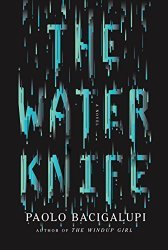
The Water Knife is set in an all-too-believable dystopian future where global warming and overconsumption of water have lead to widespread water shortages in the American Southwest. "Widespread water shortages" is an understatement. The entire region is practically in a state of civil war. California, Nevada, and Arizona are fighting in the courts and sometimes in the streets to secure access to what little water remains. Politicians, businesspeople, organized crime networks, refugees, and other everyday citizens are all struggling in their own interrelated ways to survive and get ahead in the often violent and cruel circumstances of what's left of human civilization.
This novel works on many levels -- and works on all of those levels quite successfully.
The basic elements that I would expect of almost any good narrative are all strong here. The plot, characters, and setting are all complex and compelling. I often do my reading in fairly short bursts, and I found myself wanting to extend my reading time for as long as possible. Some narratives -- even some really good narratives -- rely heavily on one or two of these elements to carry the story. But the plot, characters, and setting all work together brilliantly, like complex parts of a well-oiled machine driving the narrative forward to its conclusion.
Bacigalupi is especially good at getting inside of each viewpoint character's head, bringing the reader into their inner world, and using their perspective to reveal some very vivid and intense imagery. Anyone can tell the reader what the character is experiencing, but few authors can describe it so well that the reader feels like they're right there along with the character, experiencing all of the joys and horrors (let's be honest -- mostly horrors in this case) that the character experiences. When I read the Water Knife, I feel like I've been transported into a very real apocalyptic future -- a feeling that is terrifying on some level, but eminently rewarding as a reader.
The precise apocalyptic nature of the Water Knife is actually somewhat uncommon. This is what I've come to think of as a "mid-apocalyptic" or simply "apocalyptic" narrative rather than a "post-apocalyptic" one. In post-apocalyptic narratives, human society has collapsed entirely, leaving behind small to mid-sized bands of desperate individuals struggling to survive in the aftermath. Post-apocalyptic narratives are popular nowadays, and most stories I've come across lately are either post-apocalyptic or non-apocalyptic.
Water Knife is something in between. It offers a glimpse of an American society that is well on its way to complete collapse, but still not fully gone. To an extent, there is still a society similar to what exists today -- a civil government with various government agencies, a market economy dominated various large corporations, information and communication technologies, etc. People in power are still trying to maintain the appearance that society has not, in fact, collapsed. But in a very real sense, it's all either broken or falling apart. For large groups of people, it has already failed, leaving them in fringe situations that we would normally associate with a post-apocalyptic setting. This middle ground between today's society and a future post-apocalyptic society is a very rich space for exploring the problems of today and the direction in which they may be taking us.
What I find most rewarding about this novel is the importance of its central themes of water scarcity and global warming. Bacigalupi doesn't seem to be pushing any single solution or course of action here in the present day. However, presenting the potential horrors of where we're headed in graphic detail is enough to inspire anyone with half a brain and half a heart to give some serious thought to what we can do in the here and now to avoid water wars and climate catastrophe. Bacigalupi takes some very important concerns facing the world today and turns them into a compelling narrative that will entertain (and perhaps even inspire) many people who otherwise might not give much thought to these concerns. Good fiction doesn't always need a deep message about today's society -- but it doesn't hurt, and those are some of my favorite narratives. Bacigalupi's approach to the task of writing such narratives is among the best I've seen. I definitely recommend the Water Knife to other readers and look forward to reading more of his work!
Published on November 15, 2015 18:01
•
Tags:
book-review, clifi, climate-fiction, global-warming, paolo-bacigalupi, water-wars
Book Review: Loosed Upon the World: The Saga Anthology of Climate Fiction
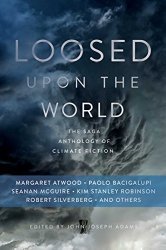
This volume brings together an impressive collection of authors with a wide range of writing styles and a variety of takes on the broadly-defined theme. As with almost any anthology, there are hits and misses. There were a few stories I'd read before, one of which is honestly not among my favorites and wasn't what I have in mind when I think of climate fiction. However, even the "misses" were still decent works of fiction that only suffered in comparison to the groundbreaking work in the rest of the anthology.
I was glad to see contributions by Margaret Atwood, Kim Stanley Robinson, and Paolo Bacigalupi. These three big names were already familiar to me and are essential reading for the emerging cli-fi genre. Robinson's piece was an excerpt from his Science in the Capital Trilogy
My favorite part of this anthology was the wide variety of writing styles and content choices. If I had to pick one story that stood out, though, I'd go with "The Precedent" by Sean McMullen. This story's premise is so dark and apocalyptic that it could have gone horribly wrong in the hands of a lesser author. However, for me, the vivid descriptions and rich characterization give this story a very real feel in spite of the incredibly stark plot and setting. This story speaks powerfully to the horrors of the climate crisis, challenge us to reflect on those horrors and our involvement in them without shoving any particular solution down our throats.
I would recommend this book both to readers who are looking for good cli-fi and to readers who are looking for good fiction in general. From now on, this will be the anthology that I recommend to people who are looking for an introduction to climate fiction.
Published on February 07, 2016 17:49
•
Tags:
cli-fi, climate-fiction, global-warming, review
Book Review: The Warming by Lorin R. Robinson
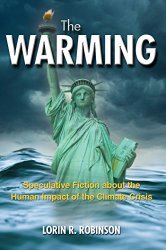
Let me start by describing what I like.
The Warming is an ambitious effort to explore many aspects of the climate crisis and its impact on the future of humanity. Rather than picking a single timeframe, location, or even storyline, the author explores the impacts of "The Warming" (anthropogenic global warming) over the course of several decades, on several continents, and in the lives of several distinct sets of characters. The scope of these narratives ranges from small personal tales to epic stories involving the ultimate fates of entire cities and nations. The possibilities explored range from dystopian destruction of existing infrastructure to utopian visions for how to survive and thrive in the aftermath of The Warming.
Some of these ideas were nothing new. Others were entirely new and unexpected. Some were so interesting that I intend to do some research about whether they were pure fiction or if they have some basis in reality. Either way, this book is worth reading if only as a collection of interesting ideas related to the climate crisis.
That's the good news. Now, on to the bad news, or at least the "definitely not five stars" news.
I don't know what to call this book. Is it a novel? The author calls it a novel, but the organizational structure is more reminiscent of a short story anthology. The author explains this unusual structure in an "important note for the reader" at the beginning of the book. The fact that this was an intentional choice -- a choice explained by the author at the very beginning -- made it more palatable. It weaves together three separate components: a primary twelve-chapter narrative about a marine biologist; a secondary narrative about an environmental news reporter; and several distinct short stories that provide some background about what's going on in the world outside of the main plotlines.
The originality and unusualness of this organizational structure initially intrigued me. I found it to be an interesting experiment both as a fellow author and as a reader. However, the more I read, the more this three-in-one structure just seemed overly busy. I would have preferred to read three shorter books: the marine biologist novel, the news reporter screenplay, and the short story anthology. They could have even been bundled in different sections of the same book since they take place in the same broad setting. However, having them split up and inserted in between each other just seemed to break the flow of the narratives. If the author is insistent that this structure is the right one for this book, then maybe this structural difficulty can be smoothed out a bit by more blatant transitions between the three elements -- for example, calling them "CHAPTER X", "EPISODE Y", and "STORY Z".
The book could also benefit from another round of basic editing. The average reader may not mind the occasional typos and style quirks, but fellow authors and industry professionals will find them distracting.
I also wasn't terribly impressed with the main narrative about the marine biologist. The ideas it explored were very interesting, but the characters and plot were lukewarm. The short stories were generally more impressive because they took a single interesting climate-related scenario and explored it succinctly from beginning to end. The main narrative (and to a lesser extent, the news reporter narrative) explored some very interesting ideas, but the characters themselves fell flat. The main character seems to be having a fairly standard-issue midlife crisis that unsurprisingly takes an adventurous and exciting turn. The supporting characters seem like little more than foils to the main character's plot arc and character development. It's not that there's necessarily anything wrong with a novel centered around a man's midlife crisis and how it relates to the climate crisis. But I feel like it will have a strong appeal to a certain male demographic, and not as much appeal to other audiences. It's interesting to a degree, but it lacks the universal appeal that I would expect from a story centered on a universal topic like the climate crisis.
In the end, the saving grace of this novel was the strength of the ideas it explores. I found myself more than willing to stick with the lukewarm elements of the novel because it centered around some interesting problems and solutions associated with the climate crisis.
Published on April 04, 2016 08:45
•
Tags:
cli-fi, climate-fiction, global-warming, review, speculative-fiction
Book Review: Ruby and the Blue Sky by Katherine Dewar

The author handles the recurring theme of climate change and climate action very well. Climate action is central to the plot, so there's a fair amount of discussion of what the characters are doing in response to the climate crisis. This approach always runs the risk of feeling forced or devolving into a lecture about climate policy. But the first person narrative, robust characterization, and compelling plot all worked together to keep me immersed in the story and involved in the theme without feeling like I was being lectured to.
The use of two narrators was interesting. Most of the story is told in the first person by the protagonist, but between her chapters, there are shorter chapters told from the perspective of the antagonist. I was initially skeptical of this approach because it's not very common, but I felt that the author used it very well in this case. The result is two very distinct voices telling the story from two very different perspectives. I appreciated the opportunity to see some of the motivations and depth of both characters, although unsurprisingly, the protagonist is the more well-developed of the two. They came together well to tell a single story.
In addition to the climate theme, there's a whole plot arc that deals with the theme of violence against women and empowerment and healing for survivors. At first, I was concerned that this might be too triggering for some readers and might take the novel in an entirely different direction. Since I'm not a woman myself, I may not be the best judge of how the topic was handled. To me, however, it seemed like it was handled well. The violence was acknowledged, but the emphasis was on empowerment and healing, both for survivors and for their friends and families. I thought it was a very meaningful and personal exploration of the theme. Hopefully it will be healing rather than triggering for readers who are themselves survivors.
Ruby and the Blue Sky is a great example of a novel that tells a nuanced and compelling story, populated with interesting characters, who happen to be grappling with their personal and collective responses to the climate crisis. Any reader could pick up this book simply because they wanted a good read, and walk away from it with some significant food for thought about global warming. That strikes me as the type of climate fiction that may have the greatest impact in the long run. Casual readers will pick it up because they've heard it's a good story and find themselves wondering if they should take any climate actions of their own.
To be honest, I'm not entirely sure that the approach the characters take to climate action would be an effective approach for the real world. But it's an approach that I can easily see people trying. It also got me thinking. Would it actually be effective? If not, what would work better? What would I do differently? These sorts of questions lead to productive thinking and dialog on the subject. They also show that I enjoyed the novel enough to take it seriously and really think it over. Those are both good signs of a good novel.
I definitely recommend Ruby and the Blue Sky to everyone who enjoys good fiction. If you have a special interest in climate fiction, then you'll definitely want to read this book.
Published on January 06, 2017 13:13
•
Tags:
book-review, cli-fi, climate, female-protagonist, global-warming
Book Review: Ship Breaker by Paolo Bacigalupi
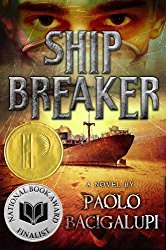
Ship Breaker is set in a distant future where the world has succumbed to the ravages of climate change and the resulting societal collapse. The main character is a young scavenger named Nailer who lives on the beach and spends his days crawling around in old shipwrecks, ripping out copper wire and any other valuables he can find for his crew to sell. His whole world is turned upside down when he comes across the salvage opportunity of a lifetime which turns out to be the start of an exciting adventure.
I thoroughly enjoyed Ship Breaker for several reasons.
The novel works well as young adult (YA) fiction. It addresses many of the most common YA themes -- family problems, friendship, betrayal, coming of age, young romance, etc. It touches all of the familiar bases without being formulaic or overly predictable. This depth of character and plot is greatly facilitated by a very well-developed setting. The setting is dystopian, but it's not the vague and generic dystopia portrayed in some YA fiction. It's a complex, gritty, realistic world that is revealed to us bit by bit through the eyes of the main character. Vivid description of this setting and the characters who populate it make this story stand out from the rest of the genre. There are several moments of violence that may be too much for really young or sensitive readers, but it all felt very appropriate to the plot and was treated very seriously and realistically rather than being glorified or sanitized.
I also like the fact that this novel works well for adults. Some YA ficton is so caught up in melodramatic genre tropes that it becomes unreadable for anyone who's grown out of their angsty teen phase. Ship Breaker leans in the opposite direction -- an excellent story that happens to include some young characters at the center of the action. The author has done a great job of crafting a tale that's accessible to young adults but mature and robust enough for older readers.
Of course, as a climate fiction author myself, one of my favorite parts of the novel is the way that it addresses climate change. The story takes place in a future setting where sea level has risen considerably, drowning coastal cities and contributing to the collapse of society as we know it. Most of the book doesn't explicitly talk about climate change, but the whole setting is a constant reminder of the consequences of our actions if we continue along our current emissions trajectory. This is a great way to get the message across without explicitly emphasizing it. There's also a point, though, where characters do explicitly discuss climate change and how their actions may contribute to it. I felt that it was handled very well -- letting the characters talk about it at a natural moment for them without having it seem forced or heavy-handed.
I would definitely recommend Ship Breaker both to young adult readers and to any older adults with an interest in climate fiction, dystopian fiction, biopunk, or any related genres. Paolo Bacigalupi is an excellent author, and I'm looking forward to seeing the film adaptation of Ship Breaker as soon as it comes out.
Published on March 01, 2017 13:32
•
Tags:
cli-fi, climate-fiction, dystopian, global-warming, sci-fi, science-fiction, young-adult
Treesong on Goodreads
Treesong is an author, talk radio host, community organizer, and Real Life Superhero. His main writing focus is climate fiction ("cli-fi"), but he is also a lifelong fan of science fiction, fantasy, a
Treesong is an author, talk radio host, community organizer, and Real Life Superhero. His main writing focus is climate fiction ("cli-fi"), but he is also a lifelong fan of science fiction, fantasy, and related genres.
This blog features Treesong's occasional musings on his writing, the writing of other authors, and anything else that comes up along the way. ...more
This blog features Treesong's occasional musings on his writing, the writing of other authors, and anything else that comes up along the way. ...more
- Treesong's profile
- 41 followers



